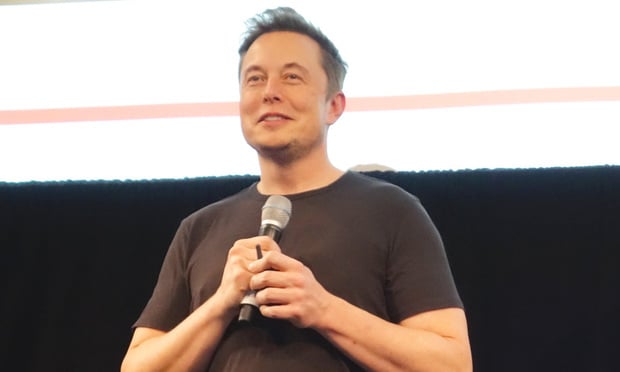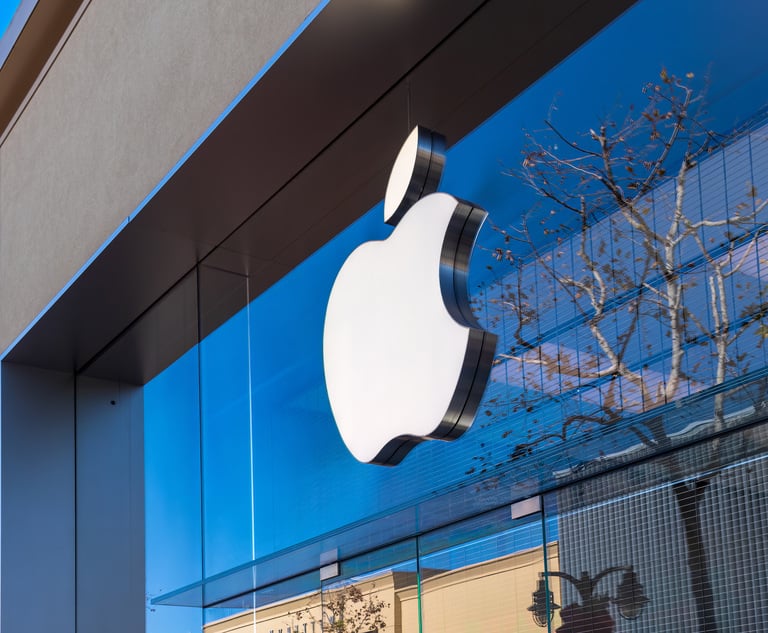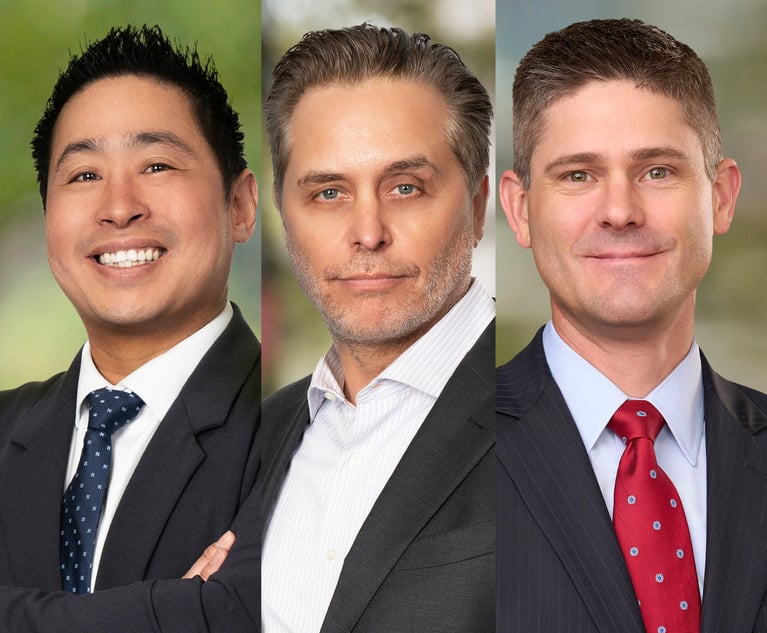Elon Musk Says His Twitter Comments Were 'Schoolyard Taunts,' Not Defamation In Cave Rescue Case
Musk called British caver Vernon Unsworth a "pedo guy" on Twitter last year in the wake of the cave rescue of a youth soccer team in Thailand and urged a Buzzfeed reporter to look into Unsworth's background. Musk's lawyers contend Unsworth must show actual malice to get his defamation claims to stick against the tech CEO.
September 16, 2019 at 01:59 PM
4 minute read
 Elon Musk (Photo: Steve Jurvetson via Wikimedia Commons)
Elon Musk (Photo: Steve Jurvetson via Wikimedia Commons)
Lawyers for Elon Musk are asking a federal judge in Los Angeles to toss the defamation lawsuit filed against the tech CEO by Vernon Unsworth, the British caver whom Musk called a "pedo guy" on Twitter in the wake of the rescue of a youth soccer team from a cave in Thailand last year.
Musk lashed out at Unsworth on social media last July after both volunteered as part of the rescue of 12 Thai boys and their soccer coach from a flooded cave last July. The caver gave a critical interview to CNN claiming that a submersible tube Musk and his team of engineers designed was a "PR stunt" prior to Musk's since-deleted Tweet calling him a "pedo guy."
Unsworth sued Musk last year with counsel from defamation specialist L. Lin Wood. The suit claimed that Musk's Twitter remarks, as well as his email exchange with a journalist at BuzzFeed urging an investigation into the caver's background, resulted in "worldwide damage" to his reputation.
Judge Stephen Wilson of the U.S. District Court for the Central District of California earlier this year denied a motion to dismiss the case filed by Musk's lawyers at Quinn Emanuel Urquhart & Sullivan. Wilson found that the issue of whether Musk's statements should be construed as fact or nonactionable opinion was a matter for a jury to decide.
In a court filing Monday asking Wilson to side with Musk on summary judgment, the CEO's lawyers contend Unsworth is a "limited purpose" public figure in connection with the discussion of the high-profile cave rescue and that the plaintiff must show actual malice to get his defamation claims to stick against the tech CEO.
"He injected himself into a public controversy by debating—on worldwide TV—the rescue, Mr. Musk's motives for participating, and the need and value of Mr. Musk's efforts," wrote the Quinn lawyers, led by Alex Spiro.
Musk's lawyers also contend that "pedo guy" was a common insult in South Africa during Musk's youth synonymous with "creepy old man." Unsworth, they contend, must show that Musk knew that his Twitter messages would be read as fact—and Musk has testified in deposition that wasn't the case.
"He intended his statements about Mr. Unsworth to be schoolyard taunts and not representations of fact," wrote the Quinn lawyers. "Read in context, Mr. Musk's tweet was a response to Mr. Unsworth's charge that the mini-submarine would not work punctuated by a dismissive and (attempted) humorous insult."
In regards to the Buzzfeed story, Musk lawyers note that he spent more than $50,000 to have a private investigator look into Unsworth's background before urging a Buzzfeed reporter to do the same in an email he says he meant to remain off the record, but that Buzzfeed later published.
"Mr. Musk paid a significant sum to hire an investigator and was told by a trusted aide that the investigator learned that Mr. Unsworth engaged in illegal activities. He passed that information to BuzzFeed in an off-the-record email so that it could conduct its own investigation," Musk's Quinn lawyer wrote. "That is not malice," they conclude.
Wood, Unsworth's lawyer, said in an interview Monday afternoon, that the investigator Musk hired had a $10,000 incentive to find anything nefarious about Unsworth, but was unable to turn up any evidence of misdeeds. The attorney said Unsworth would respond in due course with filings he promised would be "explosive." Wood said that evidence would show that Musk intended his Twitter remarks to be read as statements of fact and that he had actual malice towards Unsworth.
Wood said that Musk's email exchange with Buzzfeed coincided with unsuccessful attempts to plant negative stories in the British tabloids about Unsworth. "There's no doubt he was looking for dirt," Wood said. "When our response is filed, you're going to see that we not only played our hand, but we played his hand too and his hand is a loser."
In related news, Buzzfeed reporter Ryan Mac, the author of the story based on Musk's emails, is seeking to block an attempt by lawyers to depose him in the defamation case. Mac's lawyers at Davis Wright Tremaine write that he's protected from being forced to testify by California's reporters' shield law and because his testimony wouldn't be relevant to Unsworth's claims or Musk's defense. "The testimony Musk and Unsworth seek from Mac about why BuzzFeed made the decision to publish Musk's emails —which boils down to Mac's subjective editorial judgments, never expressed to a third party—is precisely the kind of sensitive information about the journalistic process that the privilege was designed to protect," Mac's lawyers wrote.
This content has been archived. It is available through our partners, LexisNexis® and Bloomberg Law.
To view this content, please continue to their sites.
Not a Lexis Subscriber?
Subscribe Now
Not a Bloomberg Law Subscriber?
Subscribe Now
NOT FOR REPRINT
© 2025 ALM Global, LLC, All Rights Reserved. Request academic re-use from www.copyright.com. All other uses, submit a request to [email protected]. For more information visit Asset & Logo Licensing.
You Might Like
View All
K&L Gates Files String of Suits Against Electronics Manufacturer's Competitors, Brightness Misrepresentations
3 minute read
California Court Denies Apple's Motion to Strike Allegations in Gender Bias Class Action

White & Case KOs Claims Against Voltage LLC in Solar Companies' Trade Dispute

Trending Stories
Who Got The Work
J. Brugh Lower of Gibbons has entered an appearance for industrial equipment supplier Devco Corporation in a pending trademark infringement lawsuit. The suit, accusing the defendant of selling knock-off Graco products, was filed Dec. 18 in New Jersey District Court by Rivkin Radler on behalf of Graco Inc. and Graco Minnesota. The case, assigned to U.S. District Judge Zahid N. Quraishi, is 3:24-cv-11294, Graco Inc. et al v. Devco Corporation.
Who Got The Work
Rebecca Maller-Stein and Kent A. Yalowitz of Arnold & Porter Kaye Scholer have entered their appearances for Hanaco Venture Capital and its executives, Lior Prosor and David Frankel, in a pending securities lawsuit. The action, filed on Dec. 24 in New York Southern District Court by Zell, Aron & Co. on behalf of Goldeneye Advisors, accuses the defendants of negligently and fraudulently managing the plaintiff's $1 million investment. The case, assigned to U.S. District Judge Vernon S. Broderick, is 1:24-cv-09918, Goldeneye Advisors, LLC v. Hanaco Venture Capital, Ltd. et al.
Who Got The Work
Attorneys from A&O Shearman has stepped in as defense counsel for Toronto-Dominion Bank and other defendants in a pending securities class action. The suit, filed Dec. 11 in New York Southern District Court by Bleichmar Fonti & Auld, accuses the defendants of concealing the bank's 'pervasive' deficiencies in regards to its compliance with the Bank Secrecy Act and the quality of its anti-money laundering controls. The case, assigned to U.S. District Judge Arun Subramanian, is 1:24-cv-09445, Gonzalez v. The Toronto-Dominion Bank et al.
Who Got The Work
Crown Castle International, a Pennsylvania company providing shared communications infrastructure, has turned to Luke D. Wolf of Gordon Rees Scully Mansukhani to fend off a pending breach-of-contract lawsuit. The court action, filed Nov. 25 in Michigan Eastern District Court by Hooper Hathaway PC on behalf of The Town Residences LLC, accuses Crown Castle of failing to transfer approximately $30,000 in utility payments from T-Mobile in breach of a roof-top lease and assignment agreement. The case, assigned to U.S. District Judge Susan K. Declercq, is 2:24-cv-13131, The Town Residences LLC v. T-Mobile US, Inc. et al.
Who Got The Work
Wilfred P. Coronato and Daniel M. Schwartz of McCarter & English have stepped in as defense counsel to Electrolux Home Products Inc. in a pending product liability lawsuit. The court action, filed Nov. 26 in New York Eastern District Court by Poulos Lopiccolo PC and Nagel Rice LLP on behalf of David Stern, alleges that the defendant's refrigerators’ drawers and shelving repeatedly break and fall apart within months after purchase. The case, assigned to U.S. District Judge Joan M. Azrack, is 2:24-cv-08204, Stern v. Electrolux Home Products, Inc.
Featured Firms
Law Offices of Gary Martin Hays & Associates, P.C.
(470) 294-1674
Law Offices of Mark E. Salomone
(857) 444-6468
Smith & Hassler
(713) 739-1250






